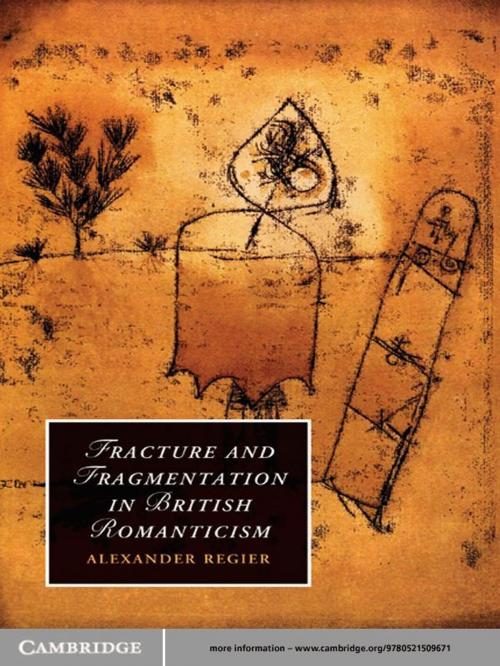Fracture and Fragmentation in British Romanticism
Fiction & Literature, Literary Theory & Criticism, British, Nonfiction, Social & Cultural Studies, Social Science| Author: | Professor Alexander Regier | ISBN: | 9780511847233 |
| Publisher: | Cambridge University Press | Publication: | March 25, 2010 |
| Imprint: | Cambridge University Press | Language: | English |
| Author: | Professor Alexander Regier |
| ISBN: | 9780511847233 |
| Publisher: | Cambridge University Press |
| Publication: | March 25, 2010 |
| Imprint: | Cambridge University Press |
| Language: | English |
What associates fragmentation with Romanticism? In this book, Alexander Regier explains how fracture and fragmentation form a lens through which some central concerns of Romanticism can be analysed in a particularly effective way. These categories also supply a critical framework for a discussion of fundamental issues concerning language and thought in the period. Over the course of the volume, Regier discusses fracture and fragmentation thematically and structurally, offering new readings of Wordsworth, Kant, Burke, Keats, and De Quincey, as well as analysing central intellectual presuppositions of the period. He also highlights Romanticism's importance for contemporary scholarship, especially in the writings of Benjamin and de Man. More generally, Regier's discussion of fragmentation exposes a philosophical problem that lies behind the definition of Romanticism.
What associates fragmentation with Romanticism? In this book, Alexander Regier explains how fracture and fragmentation form a lens through which some central concerns of Romanticism can be analysed in a particularly effective way. These categories also supply a critical framework for a discussion of fundamental issues concerning language and thought in the period. Over the course of the volume, Regier discusses fracture and fragmentation thematically and structurally, offering new readings of Wordsworth, Kant, Burke, Keats, and De Quincey, as well as analysing central intellectual presuppositions of the period. He also highlights Romanticism's importance for contemporary scholarship, especially in the writings of Benjamin and de Man. More generally, Regier's discussion of fragmentation exposes a philosophical problem that lies behind the definition of Romanticism.















